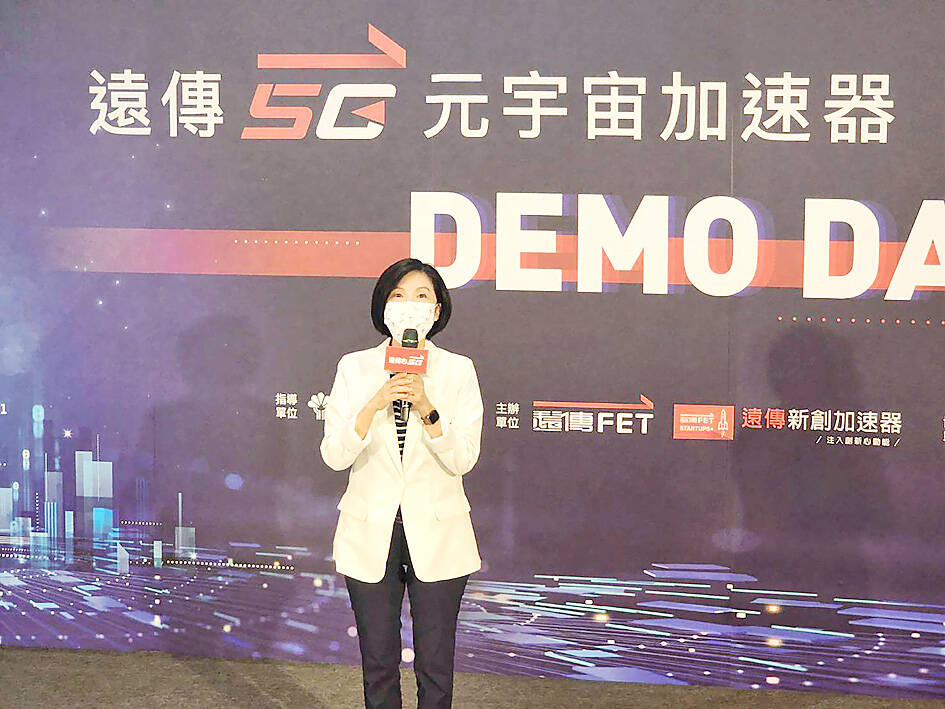Far EasTone Telecommunications Co (遠傳電信) yesterday urged the National Communications Commission (NCC) to deal fairly with a spectrum dispute, as Taiwan Mobile Co (台灣大哥大) would own a bigger slice of prime frequency band than regulations allow following the acquisition of a smaller rival.
The commission is to hold two public hearings tomorrow and on Sunday to address potential problems related to Far EasTone’s acquisition of Asia Pacific Telecom Co (亞太電信) and the merger between Taiwan Mobile and Taiwan Star Telecom Corp (台灣之星).
Taiwan Mobile’s merger would give it a combined 60 megahertz (MHz) of the 5G spectrum in the 1 gigahertz (GHz) band, surpassing the upper limit of one-third, or 50MHz, of the total auctioned spectrum of 150MHz, as the Regulations for Administration of Mobile Broadband Businesses (行動寬頻業務管理規則) stipulate.

Photo: CNA
Taiwan Mobile said the restrictions would be unreasonable after the nation’s telecommunications market again becomes dominated by the three major operators.
It suggested that the commission relax the rules and raise the limit to 40 percent.
It added that it would continue fighting for the right to retain the 10MHz spectrum in exchange for offering services that benefit the public, such as deploying more 5G base stations in rural areas.
Far EasTone and Chunghwa Telecom Co (中華電信) have called on Taiwan Mobile to abide by the regulations and return the 10MHz to the government for a second auction, or other arrangements.
“Our rival would own a bigger spectrum than the rules stipulate. That will have a big impact,” Far EasTone president Chee Ching (井琪) told reporters on the sidelines of a press conference in Taipei.
With a larger spectrum in the low-band, Taiwan Mobile would gain a competitive edge in cost, as the 1GHz band — dubbed the “golden frequency band” — would allow a wireless carrier to achieve a similar 5G network coverage by installing much fewer base stations, compared with those using a mid-band or high-band spectrum, Ching said.
Far EasTone has abided by related rules and invested heavily in acquiring 5G spectrum assets, Ching said, adding that it would make no sense if Taiwan Mobile were allowed to breach the rules and gain extra spectrum.
Far EasTone said it has deployed more than 700 base stations in remote areas, the most among local peers, to provide real-time information and healthcare delivery in Taitung and Hualien counties’ rural areas through 5G network.
The company has also helped incubate 20 local start-ups by launching applications using 5G and metaverse technologies, aiming to provide solutions for local businesses seeking to facilitate digital transformation, it said.
The solutions developed by the start-ups could create about NT$70 million (US$2.2 million) in production value, it said.
Far EasTone launched its first 5G incubator last year and started its second one yesterday.

MULTIFACETED: A task force has analyzed possible scenarios and created responses to assist domestic industries in dealing with US tariffs, the economics minister said The Executive Yuan is tomorrow to announce countermeasures to US President Donald Trump’s planned reciprocal tariffs, although the details of the plan would not be made public until Monday next week, Minister of Economic Affairs J.W. Kuo (郭智輝) said yesterday. The Cabinet established an economic and trade task force in November last year to deal with US trade and tariff related issues, Kuo told reporters outside the legislature in Taipei. The task force has been analyzing and evaluating all kinds of scenarios to identify suitable responses and determine how best to assist domestic industries in managing the effects of Trump’s tariffs, he

TIGHT-LIPPED: UMC said it had no merger plans at the moment, after Nikkei Asia reported that the firm and GlobalFoundries were considering restarting merger talks United Microelectronics Corp (UMC, 聯電), the world’s No. 4 contract chipmaker, yesterday launched a new US$5 billion 12-inch chip factory in Singapore as part of its latest effort to diversify its manufacturing footprint amid growing geopolitical risks. The new factory, adjacent to UMC’s existing Singapore fab in the Pasir Res Wafer Fab Park, is scheduled to enter volume production next year, utilizing mature 22-nanometer and 28-nanometer process technologies, UMC said in a statement. The company plans to invest US$5 billion during the first phase of the new fab, which would have an installed capacity of 30,000 12-inch wafers per month, it said. The

Taiwan’s official purchasing managers’ index (PMI) last month rose 0.2 percentage points to 54.2, in a second consecutive month of expansion, thanks to front-loading demand intended to avoid potential US tariff hikes, the Chung-Hua Institution for Economic Research (CIER, 中華經濟研究院) said yesterday. While short-term demand appeared robust, uncertainties rose due to US President Donald Trump’s unpredictable trade policy, CIER president Lien Hsien-ming (連賢明) told a news conference in Taipei. Taiwan’s economy this year would be characterized by high-level fluctuations and the volatility would be wilder than most expect, Lien said Demand for electronics, particularly semiconductors, continues to benefit from US technology giants’ effort

‘SWASTICAR’: Tesla CEO Elon Musk’s close association with Donald Trump has prompted opponents to brand him a ‘Nazi’ and resulted in a dramatic drop in sales Demonstrators descended on Tesla Inc dealerships across the US, and in Europe and Canada on Saturday to protest company chief Elon Musk, who has amassed extraordinary power as a top adviser to US President Donald Trump. Waving signs with messages such as “Musk is stealing our money” and “Reclaim our country,” the protests largely took place peacefully following fiery episodes of vandalism on Tesla vehicles, dealerships and other facilities in recent weeks that US officials have denounced as terrorism. Hundreds rallied on Saturday outside the Tesla dealership in Manhattan. Some blasted Musk, the world’s richest man, while others demanded the shuttering of his